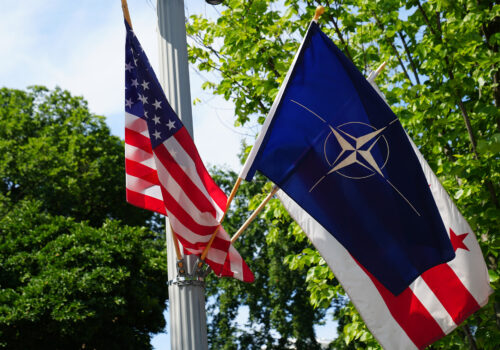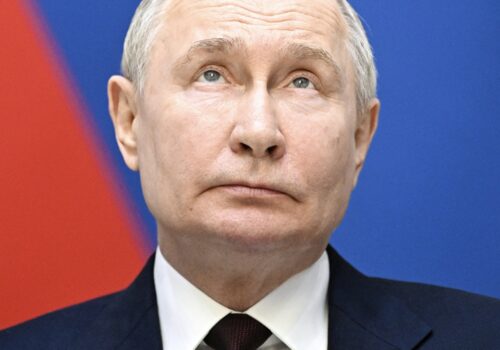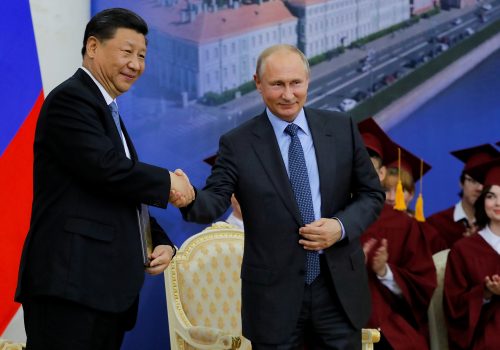The NATO Summit faces three simultaneous threats
Amid the noise accompanying NATO’s seventy-fifth anniversary summit in Washington this week—with the backdrop of growing concerns over US President Joe Biden’s health—you can be excused if you missed last week’s meeting of the Shanghai Cooperation Organisation (SCO) in Kazakhstan.
The SCO’s ten member countries, led by China and Russia, reached twenty-five agreements on enhancing cooperation in energy, security, trade, finance, and information security, including the adoption of something expansively called the “Initiative on World Unity for Just Peace, Harmony, and Development.”
Western leaders often roll their eyes at the lofty language and empty agreements of the SCO, which was invented in 2001. However, it would be a mistake to ignore the intention behind the SCO’s ambition to be a counterweight to NATO and a piece of Chinese leader Xi Jinping and Russian President Vladimir Putin’s larger goals to supplant the existing global order of rules and institutions with something more to their own liking.
It’s no accident that the SCO meeting came a week ahead of the Alliance summit, but perhaps a coincidence that it was on the Fourth of July.
“SCO members should consolidate unity and jointly oppose external interference,” Xi said, warning against the West’s “Cold War mentality,” according to Xinhua, China’s state-run news agency.
In his address to the SCO, Putin called for “a new architecture of cooperation, indivisible security, and development in Eurasia, designed to replace the outdated Eurocentric and Euro-Atlantic models, which gave unilateral advantages only to certain states.”
Putin didn’t need to mention the United States, as the SCO’s members all knew which country he meant. The organization has expanded beyond its original five members—China, Russia, Kazakhstan, Kyrgyzstan, and Tajikistan—to include India, Iran, Pakistan, and Uzbekistan. Last week, Belarus joined as the tenth member, and there are another sixteen partners and observers.
Confronting a confluence of threats
Even if one sets the SCO meeting entirely to the side, NATO leaders this week confront three simultaneous but underestimated threats, none of them explicitly on their agenda.
These threats are: (1) considerably increased coordination, particularly in the defense-industrial realm, among adversarial autocracies; (2) continued and growing weaknesses among democracies (underscored in the Atlantic Council’s newest edition of its Freedom and Prosperity Indexes); and (3) insufficient recognition among NATO’s thirty-two members of the gravity of the historic moment, reflected in their still-inadequate backing for Ukraine.
“Like a lightning strike illuminating a dim landscape,” wrote Jonathan Rauch in the Atlantic last week, “the twin invasions of Israel and Ukraine have brought a sudden recognition: What appeared to be, until now, disparate and disorganized challenges to the United States and its allies is actually something broader, more integrated, more aggressive, and more dangerous.”
China, Russia, Iran, and North Korea—working with others—haven’t formed “a NATO-like formal structure,” but instead what Rauch calls an “Axis of Resistance.” This axis, he explains, “relies on loose coordination and opportunistic cooperation among its member states and its network of militias, proxies, and syndicates.” Unable to match the United States and NATO directly, “it instead seeks to exhaust and demoralize the U.S. and its allies by harrying them relentlessly, much as hyenas harry and exhaust a lion.”
Meanwhile, writes Patrick Quirk, a nonresident senior fellow at the Atlantic Council: “The security of the United States, democratic partners and allies, and humanity’s future depends significantly on the state of democracy worldwide. Yet, over the past seventeen years, if we look at indices like those published by the Atlantic Council’s Freedom and Prosperity Center, authoritarianism has risen globally, while democracy shows alarming decline in regions of importance to the United States.”
Quirk, in a significant new report for the Atlantic Council, examines the challenges and offers solutions. They range from supercharging efforts to counter China’s malign influence to shoring up key democratic institutions in strategically important countries. He concludes with a compelling set of recommendations for the US Congress and whomever is elected US president in November—recommendations as difficult to execute as they are necessary.
Building the “bridge”
The most immediate issue for NATO this week is how best to deal with defending Ukraine and offering it a path to Alliance membership. These are decisions that will underscore whether NATO allies recognize the historic context and significance of the Ukraine challenge.
The Atlantic Council, in partnership with the Estonian foreign ministry, conducted a series of major tabletop exercises this spring to examine future Russia-Ukraine conflict scenarios and their implications for Western security.
“The results of the exercises were unequivocal,” write the Atlantic Council’s Matthew Kroenig and Estonian Ambassador to the United States Kristjan Prikk. “Europe is more stable and secure with Ukraine in NATO. Russia did not choose to escalate when Ukraine was offered NATO membership, and in all scenarios, Russia was much more cautious in its interactions with Ukraine once it was a member of NATO.”
The Alliance this week is expected to offer Ukraine a “bridge to membership,” but it will stop far short of a membership assurance. According to reports ahead of the summit, the bridge will be constructed out of increased coordination of military assistance, a pledge of long-term support, more investment in Ukraine’s defense industry, and bilateral security agreements—all measures intended to strengthen Ukraine.
Kroenig and Prikk say the lesson coming out of our exercises is clear: “[For] the sake of a better future for the entire Alliance, the bridge must be short, it must be made of steel, and it should end with a firm invitation for Ukraine to join NATO.”
That invitation is unlikely to be this week’s outcome, but a proper understanding of the historic moment requires nothing less.
Frederick Kempe is president and chief executive officer of the Atlantic Council. You can follow him on Twitter @FredKempe.
This edition is part of Frederick Kempe’s Inflection Points newsletter, a column of dispatches from a world in transition. To receive this newsletter throughout the week, sign up here.
Further reading
Wed, Jun 12, 2024
A Putin summer surprise for NATO? Worries are growing.
Inflection Points By Frederick Kempe
The Russian president likely wants to undercut NATO’s upcoming summit in Washington. The Alliance should ready a surprise of its own.
Tue, Jun 25, 2024
The path to prosperity: The 2024 Freedom and Prosperity Indexes
Report By Ignacio Campomanes, Nina Dannaoui-Johnson, Joseph Lemoine, Dan Negrea
In this “year of election,” freedom continues to decline globally. Political rights, judicial independence, and checks and balances are eroding. Prosperity growth has slowed, particularly in developing countries. The data underscores a strong link between freedom and prosperity, highlighting the need for data-driven policy reforms.
Wed, Jul 3, 2024
Advancing freedom, defeating authoritarianism: A democracy agenda for 2025-2029
Report By Patrick Quirk
This report provides actionable and measurable policy recommendations for the upcoming administration's foreign policy to advance democracy and strengthen the US position in international development.
Image: US Secretary of State Antony Blinken and NATO Secretary General Jens Stoltenberg attend a joint news conference at the State Department in Washington, U.S., June 18, 2024. REUTERS/Elizabeth Frantz



